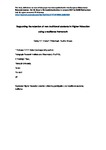Supporting the retention of non-traditional students in Higher Education using a resilience framework
| dc.contributor.author | Cotton, Debby | |
| dc.contributor.author | Nash, T | |
| dc.contributor.author | Kneale, Pauline | |
| dc.date.accessioned | 2017-02-09T11:50:50Z | |
| dc.date.available | 2017-02-09T11:50:50Z | |
| dc.date.issued | 2017-01-01 | |
| dc.identifier.issn | 1474-9041 | |
| dc.identifier.issn | 1474-9041 | |
| dc.identifier.uri | http://hdl.handle.net/10026.1/8441 | |
| dc.description.abstract |
<jats:p> Student drop-out in higher education is an increasingly important issue across Europe, but there are substantial disparities between countries and institutions which suggest that variations in policies and practices may influence student retention and success. Numerous schemes have been devised to increase student retention, frequently focusing on non-traditional groups. Retention efforts include scholarships and bursaries, enhanced monitoring and support measures, and specialist teams of staff or peer mentors. Theoretical understanding of the withdrawal of non-traditional students typically draws on social and cultural capital concepts (Bourdieu, 1986), which may have led to a rather deterministic approach to student success. Research with non-traditional students on two distinct but related projects at a UK university led us to consider the concept of resilience in helping to understand student retention and success. This paper discusses the concept of resilience and – drawing on our experiences of using a resilience framework for analysis of risk and protective factors in these two projects – considers how it might be of use in supporting student retention in the wider European context. </jats:p> | |
| dc.format.extent | 62-79 | |
| dc.language | en | |
| dc.language.iso | en | |
| dc.publisher | SAGE Publications | |
| dc.subject | Higher education | |
| dc.subject | retention | |
| dc.subject | widening participation | |
| dc.subject | non-traditional students | |
| dc.subject | resilience | |
| dc.title | Supporting the retention of non-traditional students in Higher Education using a resilience framework | |
| dc.type | journal-article | |
| dc.type | Journal Article | |
| plymouth.author-url | https://www.webofscience.com/api/gateway?GWVersion=2&SrcApp=PARTNER_APP&SrcAuth=LinksAMR&KeyUT=WOS:000394084600005&DestLinkType=FullRecord&DestApp=ALL_WOS&UsrCustomerID=11bb513d99f797142bcfeffcc58ea008 | |
| plymouth.issue | 1 | |
| plymouth.volume | 16 | |
| plymouth.publication-status | Published | |
| plymouth.journal | European Educational Research Journal | |
| dc.identifier.doi | 10.1177/1474904116652629 | |
| plymouth.organisational-group | /Plymouth | |
| plymouth.organisational-group | /Plymouth/Faculty of Health | |
| plymouth.organisational-group | /Plymouth/PS - Library and Educational Development | |
| plymouth.organisational-group | /Plymouth/Users by role | |
| dcterms.dateAccepted | 2016-05-09 | |
| dc.identifier.eissn | 1474-9041 | |
| dc.rights.embargoperiod | No embargo | |
| rioxxterms.versionofrecord | 10.1177/1474904116652629 | |
| rioxxterms.licenseref.uri | http://www.rioxx.net/licenses/all-rights-reserved | |
| rioxxterms.licenseref.startdate | 2017-01-01 | |
| rioxxterms.type | Journal Article/Review |


